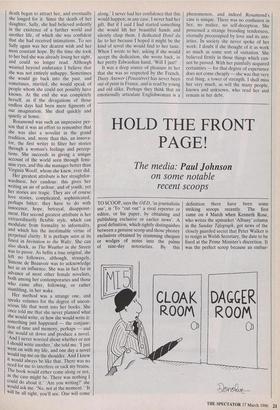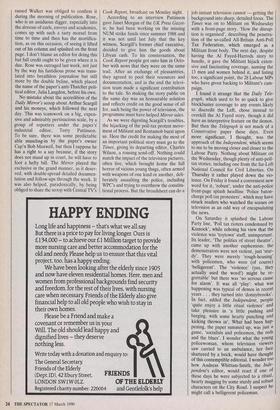HOLD THE FRONT PAGE!
The media: Paul Johnson
on some notable recent scoops
TO SCOOP, says the OED, 'in journalistic use', is `To "cut out" a rival reporter or editor, or his paper, by obtaining and publishing exclusive or earlier news'. A good definition, which rightly distinguishes between a genuine scoop and those phoney exclusives obtained by cramming cheques or wodges of notes into the palms of nine-day notorieties. By this definition there have been some striking scoops recently. The first came on 4 March when Kenneth Rose, who writes the upmarket 'Albany' column in the Sunday Telegraph, got news of the closely guarded secret that Peter Walker is to resign as Welsh Secretary, the date to be fixed at the Prime Minister's discretion. It was the perfect scoop because an embar- rassed Walker was obliged to confirm it during the morning of publication. Rose, who is an assiduous digger, especially into the dessous of earls, envoys and academics, comes up with such a tasty morsel from time to time and then has the mortifica- tion, as on this occasion, of seeing it lifted out of his column and splashed on the front page. I don't blame an editor for doing this but full credit ought to be given where it is due. Rose was outraged last week, not just by the way his fastidious prose was trans- lated into breathless journalese but still more by the double byline, which placed the name of the paper's anti-Thatcher poli- tical editor, Julia Langdon, before his own.
No mistake about the accredition of the Daily Mirror's scoop about Arthur Scargill and his moneys, which followed the next day. This was teamwork on a big, expen- sive and admirably pertinacious scale, by a group of reporters under the paper's' industrial editor, Terry Pattinson. To be sure, there was some predictable able muscling-in by the paper's owner Cap'n Bob Maxwell, but then I suppose he has a right to a say because, if the story does not stand up in court, he will have to foot a hefty bill. The Mirror played the exclusive in the grand manner, as it deser- ved, with double-spread detailed documen- tation and follow-ups through the week. It was also helped, paradoxically, by being obliged to share the scoop with Central TV's Cook Report, broadcast on Monday night.
According to an interview Pattinson gave Janet Morgan of the UK Press Gazet- te, he had been working on the missing NUM strike funds since summer 1988 and it was not until last July that the key witness, Scargill's former chief executive, decided to give him the goods about Libyan cash. To his consternation, the Cook Report people got onto him in Octo- ber with news that they were on the same trail. After an exchange of pleasantries, they agreed to pool their resources and documentation, and in the end the televi- sion team made a significant contribution to the tale. So making the story public on the same day was an honourable solution and reflects credit on the good sense of all for, such being the power of television, the programme must have helped Mirror sales.
As we were digesting Scargill's troubles, the hijacking of the poll-tax protest move- ment of Militant and Rentamob burst upon us. Here the credit for making the most of an important political story must go to the Times, giving its departing editor, Charles Wilson, a rousing send-off. Nothing could match the impact of the television pictures, often live, which brought home the full horror of vicious young thugs, often armed with weapons of one kind or another, deli- berately assaulting the police, including WPC's and trying to overthrow the constitu- tional process. But the broadsheet can do a job instant television cannot — getting the background into sharp, detailed focus. The Times was on to Militant on Wednesday with a front-page story. 'How the disrup- tion is organised', describing the penetra- tion of the so-called All-Britain Anti-Poll Tax Federation, which emerged as a Militant front body. The next day, despite having the Al Fayed-Harrods story to handle, it gave the Militant hijack exten- sive and fascinating coverage, naming the 13 men and women behind it, and listing too, a significant point, the 28 Labour MPs who have given backing to Militant's cam- paign.
I found it strange that the Daily Tele- graph, which used to be so quick to give blockbuster coverage to any events likely to discredit the Left, chose instead to overkill the Al Fayed story, though it did have an interpretive feature on the demos. But then the Telegraph is not much of a Conservative paper these days. Even more significant, I thought, was the approach of the Independent, which seems to me to be moving closer and closer to the Labour Party. Nothing about Militant on the Wednesday, though plenty of anti-poll- tax stories, including one from the far-Left National Council for Civil Liberties. On Thursday it rather played down the vio- lence. On Friday it found a convenient new word for it, 'robust', under the anti-police front-page splash headline 'Police baton- charge poll tax protesters', which may have struck readers who watched the scenes on television as an odd way of encapsulating the news.
On Saturday it splashed the Labour Party line, 'Poll tax rioters condemned by Kinnock', while echoing his view that the violence was `toytown' stuff, unimportant. Its leader, 'The politics of street theatre', came up with another euphemism: the demonstrators were not violent, just 'stur- dy'. They were merely 'rough-housing' with policemen, who were (of course) `belligerent'. The 'violence' (yes, they actually used the word!) might be re- grettable' but there was 'no serious cause for alarm'. It was all 'play': what was happening was typical of demos in recent years . . . they turned into 'donnybrooks'. In fact, added the Independent, people `quite enjoy a little ritual violence' and take pleasure in 'a little pushing and barging, with some hearty punching and kicking thrown in'. What had been hap- pening, the paper summed up, was just a game, 'socialists and policemen, the reds and the blues'. I wonder what the young policewoman, whom television viewers saw carried to an ambulance, her face shattered by a brick, would have thought of this contemptible editorial. I wonder too how Andreas Whittam-Smith, the Inde- pendent's editor, would react if one of these days he were subjected to a ritual, hearty mugging by some sturdy and robust characters on the City Road. I suspect he might call a belligerent policeman.



























































 Previous page
Previous page